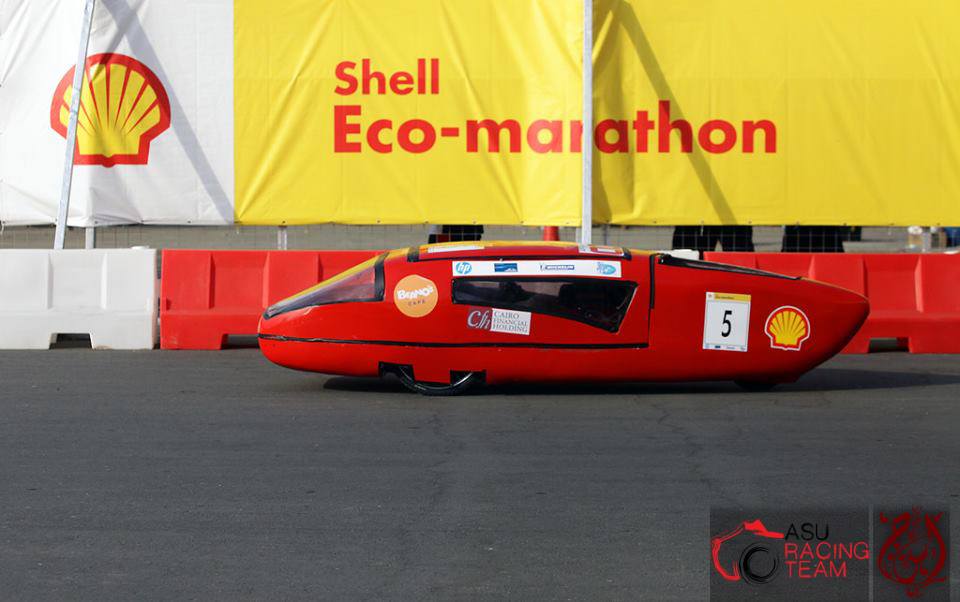Ain Shams University Racing Team: Egypt’s First Student Automotive Team is Leading the Way in Experimental Education

Hend Salah
Experiential education is a fundamental asset to modern schooling; one that allows students to develop their skills, equip them for future careers and, in some cases, even contribute to their communities.
Aspiring to integrate experiential education and learning active learning methods in education – one of the things which Egypt’s educational system lacks especially in the public sector – Ain Sham University’s Faculty of Engineering established the ASU racing team; a group of young Egyptian engineers who design and manufacture automotive and mobile robotics to compete in regional and global competitions for engineering students from all over the world.
Founded in 2012, the ASU racing team began with only 11 students. Now it has over 250 students divided over four main teams; Formula Student, which is tasked with designing and building cutting-edge racing cars; Eco Gasoline, a team manufacturing a car to travel the farthest distance using one litre of petrol; Remotely Operated Vehicles (ROV), which works to create an underwater vehicle; and the Hybrid Electric team – a team manufacturing a car that runs on both gasoline and electricity.
“My team includes students from almost all disciplines from electrical, mechanical, mechatronics, computer engineering to civil and architecture, Abdel Rahman Ibrahim, Captain of Hybrid Electric team told us. “Each student is responsible for parts in the car that matches his/her studies,”
According to Khaled Ghobashy, captain of the Formula team, participating in global engineering competitions is a rewarding and an exceptional learning opportunity which enables students to actually practice with their own hands what they’ve been taught, though, often times, students find it difficult to align between a global competition and their studies.
“Many students had to quit the team because they were unable to balance between their studies and their work with the team especially that all competitions have deadlines which sometimes clashes with our finals,” Ghobashy revealed.
Perhaps the real challenge which sometimes stands in the way of the ASU racing team is money; which sometimes forces students to readjust their designs to fit their limited budget.
“The university has a budget for each team, but it isn’t enough to cover the entire process, which leaves us with two options; either applying changes in our original designs or coming up with a way to collect money,” explained Ghobashy, adding that sometimes students and doctors pay from their own pockets to cover ASU’s expenses or often times, a sponsor offers to provide for the teams’ finances.
Aside from the funding challenges, there are also technical challenges, which sometimes hinder the manufacturing process.
Abdel Rahman Ibrahim recalls that his Hybrid Electric team worked months on designing a prototype, only to find out during the installation process that the car parts don’t fit together, which made them re-design the prototype from scratch.
Despite these challenges, the ASU racing teams have managed to achieve remarkable success. After being approached to take part in 2015 edition of the Shell Eco-Marathon in Philippines, Merna Abbas and her Eco-Gasoline team came 10th out of 33 teams from around the world.

According to Dr. Mohamed Abd El Aziz, one of the Faculty professors, students gained a great deal of technical knowledge and experience from participating in the these competitions and have become more qualified to enter an already established organization or even start up their own engineering projects after graduation.
“We are injecting in the market actual engineers who can design,” Abd El Aziz, said, adding that companies like General Motors and Toyota already recruited engineering graduates who participated in the ASU racing team.
According to Ahmed El Yamani, captain of the ROV team, the exposure students get from global engineering competitions is extremely valuable because major companies in the field are always present during these events, watching competitors up-close and preparing to sponsor the promising teams.
The companies who sponsored the ASU racing team include Bavaria Auto Group –which funded the ASU team – and Arab Organization for Industrialization, which provided the students with a manufacturing space in Kader Factory.
The ASU team has a supervising committee, which consists of doctors, and teaching assistants whose role is to offer advice and make sure that students are following the right engineering standards in their designs as well as taking care of any legal paperwork requested whether for purchasing materials or travelling.
“These competitions proved that students can work alone on developing and improving their problem-solving as well as expanding their existing knowledge and skills,” Abd El Aziz concluded.
For more information on the ASU racing team, click here.
(Photos courtesy of ASU Racing Team)
recommended
 Restaurants
Restaurants
Cairo's Ramen Revival: 5 Must-Try Bowls Around the City
Asian Food Asian Restaurants Cafés
Cafés



